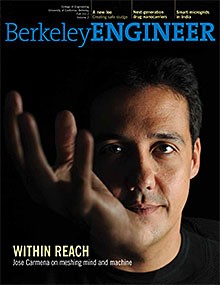Decisions, decisions
It has been a busy year for the Berkeley developers of the new web app, Politify. It was only October of 2011 when Nikita Bier, then a political economy and business major, approached Jeremy Blalock, a second-year EECS student, to collaborate on an easy-to-use app to analyze public policy. They developed a non-partisan tool that enables voters to evaluate the costs and benefits of each presidential candidate’s promised policies.
“I joined this project because a lot of the news media just deals with the points that they can cover best, which are the soft points,” says Blalock. “Politify really presents the flip side of the scale, the economic side of politics. When I listen to NPR I hear a lot of interesting information, but I don’t hear how it will affect me, which is a very relevant thing to consider when voting.”
Politify curated and parsed open data from the Internal Revenue Service and the Census Bureau, then overlaid economic models from the Tax Policy Center. The result is an economic forecast that shows the candidates side-by-side. The analysis is broken down to the individual level, the local level and national level. The cost and benefits of the candidate’s position change based on user-inputted income, tax filing status and zip code.
In the run-up to the election, Politify had received over a million views. Post-election, they plan on continuing the project. “We want this to be applied to other things down the road, and we think this can be used for other policies,” says Blalock. “Our overarching goal is to make a more informed voting public. If we can make people more informed, then they will be more engaged.”

